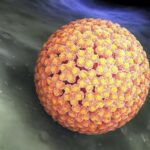
Are you experiencing female dryness (vaginal dryness)? It’s not just a problem for post-menopausal women. Dryness can lead to itching, burning, and painful sex, and can even cause you to urinate more often. This condition is often associated with vaginal atrophy, also known as vulvovaginal atrophy (VVA), and if you’re between the ages of 40 and 45, you have a 20% chance of experiencing female dryness. If you’re post-menopausal, you have about a 66% chance of developing this condition—also known as genitourinary syndrome (GSM).
But don’t worry, in this article on PregnancyBoss, we will discuss natural cures for female dryness and lifestyle changes you can try to relieve your symptoms.
What are the causes of Female Dryness?

In many cases, vaginal dryness happens when estrogen levels decrease. This occurs naturally as you age or during menopause. When estrogen levels decline, the skin and tissues of your vulva and vagina become thinner and less elastic, and your vagina can become dry.
Low estrogen levels can be caused by a variety of factors, including:
- Chemotherapy or radiation therapy: These treatments can damage the ovaries and decrease estrogen levels.
- Full hysterectomy: A hysterectomy that includes the ovaries can cause low estrogen levels.
- Premature ovarian failure: Premature ovarian failure can cause low estrogen levels.
- Genetic conditions: Turner syndrome and Fragile X syndrome are examples of genetic conditions that can cause low estrogen levels.
- Medical conditions: Certain medical conditions, such as Sjogren’s syndrome and immune disorders, can cause vaginal dryness.
- Chronic illnesses: Chronic kidney disease and low-functioning pituitary gland are examples of chronic illnesses that can cause low estrogen levels.
- Eating disorders: Anorexia and bulimia can deprive the body of the nutrients it needs to keep hormone levels balanced.
- Certain medications: Certain medications, such as contraceptive pills, antidepressants, and anti-estrogen medications used to treat uterine fibroids, can also cause a decrease in estrogen levels and lead to vaginal dryness.
- Breastfeeding: Breastfeeding can also cause a decrease in estrogen levels, which can lead to vaginal dryness.
- Extreme levels of stress: Intense physical or emotional stress can lower estrogen levels.
- Hygiene practices: Using perfumed soaps, washes, or douches in and around your vagina can also cause vaginal dryness.
- Excessive exercise: Over-exercising can lead to low estrogen levels.
- Not being aroused during sex: Vaginal dryness can also occur if you are not aroused during sex.
What are some natural cures for Female Dryness?
There are several natural cures for female dryness that can be helpful. Here are some of the most effective ones:
- Coconut oil: Coconut oil is a natural emollient that can help moisturize the skin. You can apply it to the vaginal area by massaging it slowly.
- Herbal oils: Herbal oils such as almond oil and olive oil can also be used to moisturize the vaginal area. Make sure to consult with your healthcare provider before using any home remedies for dryness in private parts.
- Apple cider vinegar: Apple cider vinegar has antifungal, antibacterial, and anti-inflammatory properties that can help ease symptoms of vaginal dryness. Mix one part apple cider vinegar with 10 parts warm water and apply directly to the affected area with a cotton ball or pad.
- Herbal remedies: Certain herbs such as chamomile, calendula, and yarrow have anti-inflammatory properties that can help reduce inflammation and irritation caused by dryness. Make an herbal infusion by boiling one teaspoon of the herb in a cup of water for 10 minutes, then strain and allow to cool. Apply directly to the affected area several times per day as needed.
What are the treatment options for Female Dryness?
Vaginal dryness can be treated with a variety of options, including medications, natural remedies, and lifestyle changes. Here are some of the most common treatment options:
- Vaginal moisturizers: These products, such as K-Y Liquibeads, Replens, and Sliquid, can be applied to the vaginal area every few days to restore moisture. They are different from lubricants in that they are longer-acting and can help to improve vaginal health over time.
- Water-based lubricants: Lubricants such as Astroglide, K-Y Jelly, and Sliquid can be used during intercourse to reduce discomfort.
- Topical estrogen therapy: Vaginal estrogen is one of the most effective treatment options for vaginal dryness. It can be applied directly to the vaginal area and works by replacing or acting like estrogen in the body. This treatment requires a prescription.
- Selective estrogen modulators (SERMs): Medications such as ospemifene (Osphena) act like estrogen in the body and can be taken orally.
- Natural remedies: Some natural oils, such as grape seed, olive, and coconut oil, can be used as lubricants or moisturizers. Pelvic floor exercises can also help to strengthen weak vaginal muscles.
- Lifestyle changes: Drinking plenty of water, avoiding douching and scented products, and wearing cotton underwear can all help to improve vaginal health and reduce dryness.
Are there any foods that can help with Vaginal Dryness?
Yes, there are certain foods that can help with vaginal dryness. Here are some of the most effective ones:
- Foods rich in omega-3 fatty acids: Eating oily fish like salmon, sardines, or mackerel three times a week, or adding a spoon of flaxseed to your diet can help increase lubrication and reduce dryness.
- Soy products: Soy products such as soy milk, soy yogurt, and miso soup contain isoflavones, which are phytoestrogens that can help boost the body’s estrogen production and reduce vaginal dryness.
- Dark leafy greens: Experts recommend dark leafy greens such as kale, cabbage, and collard greens for increased lubrication and overall vaginal health.
- Apples: Apples are also recommended for vaginal health as they contain phytoestrogens that can help reduce dryness.
Are there any lifestyle changes that can help with Vaginal Dryness?
Yes, there are lifestyle changes that can help with vaginal dryness. Here are some of the most effective ones:
- Stay hydrated: Drinking plenty of water can help to keep your body hydrated and improve vaginal health.
- Avoid douching and scented products: Douching and using scented products can disrupt the natural balance of bacteria in the vagina and cause dryness.
- Wear cotton underwear: Cotton underwear is breathable and can help to reduce irritation and moisture buildup in the vaginal area.
- Use water-based lubricants: Lubricants such as Astroglide, K-Y Jelly, and Sliquid can be used during intercourse to reduce discomfort.
- Try pelvic floor exercises: Pelvic floor exercises, also known as Kegels, can help to strengthen weak vaginal muscles and improve blood flow to the area.
It’s important to note that lifestyle changes alone may not be enough to treat vaginal dryness, especially if it is caused by hormonal changes.
Can drinking more water help with Vaginal Dryness?

Yes, drinking more water can help with vaginal dryness. When your body is dehydrated, it has to decide which of your organs needs fluids the most. When compared with things like your heart and lungs, your skin isn’t high on the must-hydrate list. As a result, your skin and lips can feel pretty parched. Drinking more water can clear up the issue within hours. One of the simplest and most effective ways to combat vaginal dryness is to drink enough water each day. This helps keep your body hydrated, including your vaginal skin.
According to Dr. Sherry A. Ross, being regularly dehydrated can just make vaginal dryness worse. Therefore, it is important to stay hydrated by drinking enough water to help reduce vaginal dryness.
How much water should you drink to help with Vaginal Dryness?
According to the Mayo Clinic, on average, women need to consume about 11.5 cups of fluids per day, which includes all fluid intake, including from beverages like coffee and that which you get from foods.
When to see a doctor for Vaginal Dryness?
If you’re noticing vaginal dryness impacting your life, it might be time to consult a doctor. Whether it’s affecting your sex life, causing discomfort, or interfering with daily activities, seeking professional advice is essential. Don’t dismiss even mild symptoms – they could indicate an underlying issue. If over-the-counter solutions aren’t helping or if you experience additional symptoms like painful urination, bleeding after sex, or vaginal soreness, it’s advisable to see a specialist. Remember, your health and well-being come first, so reach out to your healthcare provider to address any concerns regarding vaginal dryness.
Your primary care physician may be able to help you find a solution for vaginal dryness, but it’s more likely that you will see a gynecologist.
Frequently Asked Questions (FAQs)
What is vaginal atrophy?
What are some natural remedies for vaginal dryness?
How does sexual activity help with vaginal dryness?
What should I avoid if I have vaginal dryness?
How does exercise help with vaginal dryness?
Can diet affect vaginal atrophy?
What is the most natural way to prevent vaginal dryness?
What are some alternative treatments to vaginal dryness and atrophy?
Can herbs help with vaginal dryness?
Are natural remedies for vaginal dryness effective?
While there are studies that show the benefits of natural remedies for vaginal dryness, these are insufficient. There is a need for large-scale human studies to establish the true extent of the benefits of these home remedies on human health. Thus, these should only be taken with caution and never as a substitute for medical treatment.






